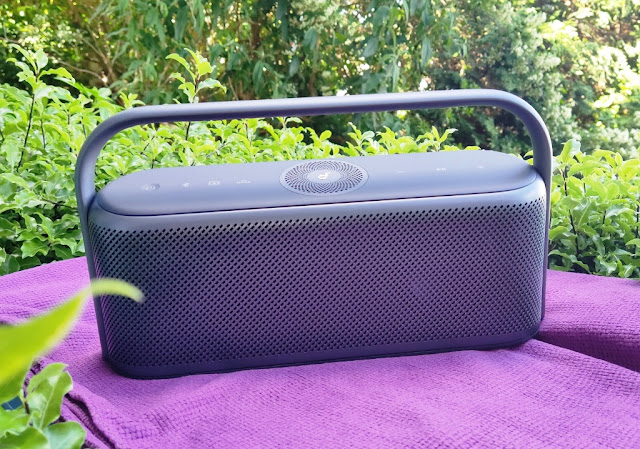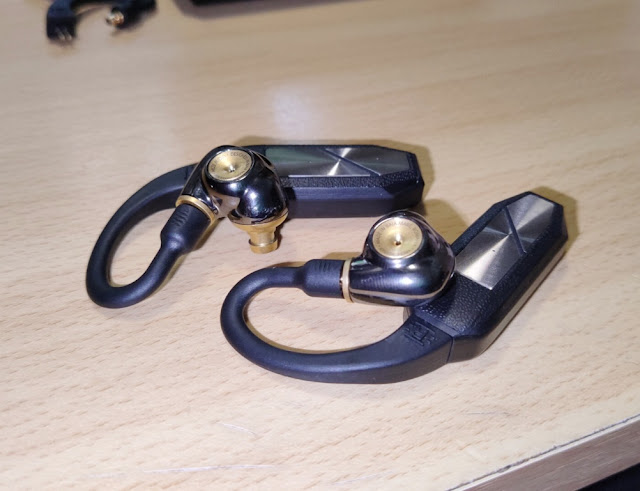
Raise your audio game with the new JOBY Wavo POD - a USB condenser
microphone with headphone jack for sidetone monitoring, microphone stand
and pop filter.

JOBY Wavo POD is plug and play so, it is easy to setup. Simply plug
into a computer and you're good to go. The JOBY
Wavo POD microphone is entirely made of plastic, including the grille,
red guard trim, knob and button. The dimensions are 14cm tall, 6cm wide
and 7cm deep including the knob which has a clicky centre push button
for switching between 3 function modes: gain, sidetone monitoring volume
and mic mute. The knob sits on top of a rotary encoder with low/medium
resistance; hence the knob rotates freely with little resistance so, it
provides
very little tactile feedback.

The button below the knob is designed to toggle
between pickup modes: cardoid mode and omnidirectional mode. Cardiod
mode turns the Wavo POD mic into a unidirectional microphone picking
sound
only from the front side. The ominidirectional pickup pattern
picks sound from all around (front, sides and back).

The rotary knob
integrates an
led ring, which turns different colors to indicate each function. Red
led color activates mic mute, while blue color indicates "sidetone
mode", which is a really useful feature that lets you optimize the gain
by checking the volume level of the sound source so, the recording isn't
shouty (very annoying) or
too quiet, which is also hampers a successful recording.

The Purple led color indicates "gain mode", which
allows you to increase and decrease the volume level of the microphone.
How low or high you adjust the mic gain depends on the loudness of
the sound source, distance from sound source and type of sound source
(constant or variable). The type of sound source is very important
because this will mainly determining whether to set the Wavo POD mic gain low or
high to avoid clipping (distortion), which easily happens when setting
the mic gain too high when recording a variable sound source such as a dynamic conversation.
When recording dynamic sounds with
variable volume, it is always better to set the mic gain a bit lower for
headroom and minimize clipping (distorting) the recording. Some people
like setting their mic gain to -12dB (high) and others to -6dB (low).
The JOBY Wavo POD microphone doesn't have a built-in meter - most microphones don't - even USB audio interfaces such as the

can check the gain level using
any digital audio workstation (DAW) software such as Logic Pro X. A
very important thing to remember when checking the mic gain level is that

Along with the microphone, you get a red "JOBY" branded curved shield
pop filter, which is detachable and measures about 8.5cm high and
9cm long. The pop filter mesh is made of metal while the clip is made of
plastic. You can add a second pop filter to the microphone too but by
buying an spare one from
JOBY website.

When
plugged into a computer, the JOBY Wavo POD microphone gets recognized as
a speaker and this is because of the built-in headphone jack, which is
dual
purpose. As well as sidetone monitoring , the JOBY Wavo POD microphone
headphone jack has passthrough audio function so, you can listen to
listen to audio on your computer via the JOBY Wavo POD microphone
without having to physically connect your headphones into the computer.
This is very useful if your computer aux/3.5mm port happens to not
work.

The JOBY Wavo POD microphone also comes with a very nice cradle
stand with a swivel round base (10cm in diameter). The cradle measures
14cm tall and integrates a thumbscrew (plastic head and metal body) on
each side designed to suspend the microphone in mid-air. The thumbscrews
integrate a thick rubber shock absorber ring, which also helps to keep
the thumbscrew snugly screwed in.
When mounted on the cradle stand, the JOBY Wavo POD microphone measures
25cm tall and can be tilted up to 360 degrees on the y axis.

The cradle
stand is designed to rotate around the base and, you can also detach it
from
the base by unscrewing, allowing you to attach the cradle stand on a
standard tripod male thread (1/4-20 inch). The base of the cradle stand
is also fitted with shock absorbing padding (closed cell foam), which
also prevents the cradle from skidding on a desk.

The
threaded holes labeled "JOBY Links" - are 1/4-20 inch female threads
which
allow you to attach flexible tripod arms so, you can attach accessories
such as a phone and camera onto the Wavo POD microphone. There are a
total of
three JOBY Links - one on the back of the Wavo POD microphone and two
JOBY Links on the cradle stand U bracket.

The bottom of the
JOBY Wavo POD microphone also integrates a threaded hole (3/8 inch),
which can be converted to a 5/8 inch thread via the included 3/8 inch
male to 5/8 inch female adapter. One potential deal breaker for the Wavo
POD is the lightweight plastic construction, which makes the mic eel
cheap. The included cradle stand is made of solid aluminum
metal though, which is nice as this gives the JOBY Wavo POD microphone a
premium feel. Te JOBY Wavo POD microphone by itself weighs 214
grams. The pop filter shield weighs 44 grams and the cradle stand weighs
463 grams. Total combined weight of the JOBY Wavo POD microphone and
accessories is 721 grams.

As far as sound
quality performance, the Wavo POD mic has an analytical sound signature;
hence the audio you record will have a flat and bright sound profile.
The Wavo POD mic works great for most voice recording jobs such as
videogame
commentary, podcasts, interviews and recording vocals but not all (e.g.
bass voice) due to the bright/flat sounding signature. It is not the most ideal mic for music recording, although you may
be able to use the Wavo POD for miking a drum kit. You can record from
2-3ft away but the best recording quality is obtained when the Wavo POD mic
is set at arm's length from the sound source.

Other accessories included with the Wavo POD are two rubber cables: a
3 meter long USB-A to USB-C cable and a 2 meter male to male USB-C
cable. JOBY
Wavo POD had a "positional led ring" rotary encoder (such as a neopixel
led ring for Arduino) to allow you to track the current value and make
it easier to set the volume and gain at a specific level without having
to use a DAW. You can buy the JOBY Wavo POD from amazon.











0 comments